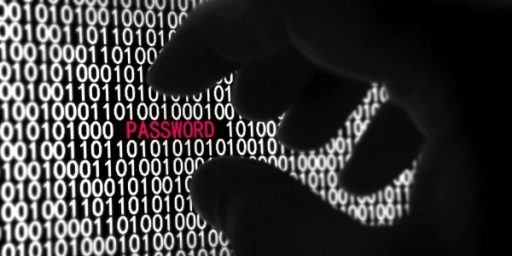Appeals Court Rules Husband Can Be Charged Criminally For Reading Wife’s Email
Domestic dispute or criminal act?
Just under a year ago, James Joyner wrote about a case out of Michigan about a husband who was being prosecuted under that state’s computer crimes statute for accessing his wife’s email without permission. This excerpt from the original story provides the details:
Could someone face prison time for snooping through a spouse’s e-mails?
For Leon Walker of Michigan, the answer was yes.
Suspecting that his wife was involved with another man, and worried that it was affecting their daughter, Walker logged into Clara Walker’s Gmail account last summer. Walker, 33, said it was easy for him to log in because his wife kept the password in a book next to the computer. “I definitely felt it was OK to confirm [the affair] by reading her e-mail in our home,” said Walker.
While Walker believed it was OK, Oakland County prosecutors did not and have charged Walker with felony misuse of a computer. If convicted, he could face up to five years in prison.
[…]
Prosecutors contend that Walker — who is a computer technician — illegally hacked into his wife’s computer after she had filed for divorce, but Walker’s lawyer calls the prosecution’s claim an overzealous application of a law meant to protect trade secrets and credit card data.
“People who live under the same roof, be they married or not, and who share a computer — as in this instance — they may have some personal privacy lines that they adhere to. And if they don’t, that’s between the two individuals,” defense attorney Leon Weiss said.
“The word ‘e-mail’ does not appear in this statute. This is an anti-hacking statute,” Weiss said. “It does not, in any way, shape or form encompass reading somebody’s e-mail.”
Over the past year, the case has made its way back and forth through District and Circuit Courts in Oakland County, Michigan as the prosecution and defense argued over whether what Walker did could be charged under the applicable statute. After losing on that issue in the last hearing, Walker appealed, and, earlier this week the Michigan Court of Appeals ruled that Walker can indeed be charged under the facts alleged and proven in preliminary hearings:
Cuckholded husband Leon Walker’s attempt to have the felony case against him dismissed for hacking into his wife’s email failed Wednesday when the Michigan Court of Appeals ruled prosecutors have sufficient evidence to charge him with a crime.
Walker, of Rochester Hills, was charged with a five-year felony after accessing his estranged wife’s email on a shared computer and using some of the information in their divorce proceedings. He told the court he “guessed” her password.
Walker, her third husband, reportedly discovered in his snooping that she was having an affair with her second husband.
Walker also printed emails and delivered them to his wife’s first ex-husband, who was embroiled in a child custody dispute with her. The ex tried to use the documents to prove neglect.
Walker, an Oakland County Information Technology employee, sought to have the case against him dismissed, arguing the statute under which he was charged “prohibits the unauthorized access of computers, computer programs, computers systems, and computer networks, and that an email account does not fall under any of those categories,” according to court documents.
The circuit court disagreed, ruling that “Gmail is a computer system and, although the statute does not refer to email, the district court analogized the case to a felonious assault where a gun was used but an item such as a bullet or gun powder that is not specifically named in the statute harmed the victim.”
The Court’s opinion deals largely with a technical interpretation of the Michigan statute, but it finds that Walker did indeed act in a manner covered by the law:
Defendant admitted to the police that he accessed his estranged wife’s Gmail account after guessing her password. Defendant then gave copies of her emails to a third party. Thus, a reasonable inference can be drawn that defendant acted intentionally when he accessed his wife’s Gmail account, used the account to view her email messages, and printed the messages to distribute to a third party.
Second, there was evidence that defendant acted without authorization when he accessed his estranged wife’s Gmail account. Defendant’s wife testified that her Gmail account was a personal account and that she never shared her passwords for the account with defendant or granted him permission to access the account. Further, she allowed defendant to use her computer only when it needed a repair. Defendant admitted to the police that he accessed his wife’s Gmail account by guessing her password. These facts support a reasonable inference that defendant lacked authorization for his access of his wife’s Gmail account.
Next, the evidence at the preliminary examinations established that defendant accessed or caused access to be made to a computer program, computer, computer system, or computer network. Detective Carol Liposky, testifying as an expert on computer crimes and computer-forensic issues, explained that a user’s messages are stored on the Gmail server. A server is a computer. The emails cannot be accessed without a password. After a user signs in with a valid password, email messages are retrieved from the Gmail server through the Internet. The Internet is a computer network. Further, Gmail is a computer program because it is written by programmers to perform certain tasks, i.e., to function as an email client by which users can send emails, accept incoming emails, and delete emails. The Gmail servers act as a computer system by performing the required functions. Thus, Liposky opined that by accessing Gmail, a person uses a computer program, a computer system, a computer network, and a computer. “She’s accessing it using a computer, she’s using the Internet, which is a computer network, and a program such as Gmail, that it [sic] was created specifically for e-mail.” Thus, the evidence supports a conclusion that by guessing his wife’s password and then using her Gmail account, defendant accessed or caused access to be made to a computer program, computer, computer system, or computer network.
Finally, the prosecutor presented evidence that defendant acquired, altered, damaged, deleted, or destroyed property or otherwise used the service of a computer program, computer, computer system, or computer network. Defendant used the services of Gmail when he gained access to his estranged wife’s account, viewed her emails, and printed them to distribute to a third party. Further, by viewing, printing, and distributing the emails, defendant acquired his wife’s property, i.e., her password-protected emails containing restricted personal information or other tangible or intangible items of value. MCL 752.793(1).
One legal analyst, though, raises an interesting policy question:
At the Appeals Court level, legal analyst and Talk Radio 1270 morning show host Charlie Langton said he’s surprised at the decision.
“I think in this day and age we should prosecute people for real crimes that involve misuse of your position for personal gain,” Langton said.
He also thinks it’s an issue for family court, and not criminal court.
“The criminal court should not interfere in what appears to be a very messy divorce,” Langton said.
This is not an uncommon issue in domestic relations cases these days. Indeed, it seems that a common means by which infidelity is discovered in the day and age of e-mail, text messaging, and Twitter is via illicit communications “accidentally” discovered by one spouse concerning the other. How accidental these discoveries actually are is another question, of course, since it’s usually the case that someone has to go looking for this kind of stuff, and have reason to do so, in order to find it. Legally, though, doing so often violates not only state laws, but also Federal laws that prohibit unauthorized access to stored communications, such as the law in Michigan. In Virginia, for example, such activity would generally be covered by the law against Computer trespass. There are no exceptions in these laws for adults living together in the same household or married couples, so prosecutions like this are likely to become the rule rather than the exception in the future.
The question is, should they? Langton makes a good point above, I think, when he argues that the facts at issue in the Walker case make it seem more appropriate for Family Court than Criminal Court, perhaps via court rules that state that evidence of infidelity obtained in this matter would not be admissible in Court, perhaps by other means. Sending someone to jail in this situation strikes me as a bit of an overreach and, perhaps, a misapplication of prosecutorial resources that could be better applied to violent crime and fraud.
H/T: Volokh Conspiracy







I respect a person’s right to privacy, but I lose respect for the legal system, and the people who control it (lawyers), when it is used to adjudicate morality disputes. Do you ever wonder why people “go postal?” I contend that the legal system is breeding the same degree of discontent and anger because the system is so rigged in favor of itself and its rent seeking adjudicators. Lawyers may proclaim that “justice is blind,” but in today’s legal system, justice is heavily weighted in favor of the litigators while the plaintiffs and defendants are “blinded” by the byzantine process and amoral decisions. It seems that the legal system encourages the victim and entitlement mentality which is shredding the moral fabric of our society.
Why? The fact that the information gathered was used in a divorce proceeding is besides the point. The issue is whether it is a crime for someone to access your private documents, be they physical or virtual, without your consent.
I would agree that five years in jail would be an absurd penalty in this case, but you know as well as anyone that such a maximum sentence would never be handed down to a (I assume) first time offender in these particular circumstances. He would probably get a small suspended sentence or some other appropriate penalty.
If this case involved opening a piece of snail-mail, the results would be likely the same: the threat of a federal prosecution. It is a federal crime to open and read the mail of another person, even a spouse or adult child, without permission. Opening mail leads to a potential prison sentence of 5 years and a $250K fine.
I agree with Tano that the fact that this case involves a divorce is immaterial. I also know that were I to open my wife’s mail, divorce would likely be a consequence in addition to whatever the feds proposed.
@John Burgess:
Sorry, this is a bit off-topic, but is this serious? Is this normal in relationships?
In my household, normal is that we open each others mail in many cases. E.g. I’m out of town and a letter arrives that “looks important” so she opens it, scans it, and emails it to me without needing permission. Or, whoever gets the mail pulls out the letter opener and opens everything as a convenience for the other person.
@qtip:
Not me. And not because of any implied threat from my wife either (she gets irritated with me when I refuse to dig in her purse for anything be they keys or whatever). There are just personal privacy barriers I was raised to respect. Maybe that is just old school or something.
I agree w/ the legal analyst; this is an overzealous prosecution; the only thing that gives me pause is the distribution to third parties of the information. However, that information intended to be used for a legal advantage in court has independent protections since the court won’t allow improper evidence into the record.
My wife and I know each others passwords; I’ve had reason to access her internet account (with her foreknowledge) before. (Both of our parents maintain single e-mail accounts, which we find confusing) I’m not saying these are or should be the norms, but the expectations of privacy are significantly mutable among co-habitators. Its a bad place for the law to get involved, particularly with respect to something as minimal as “privacy.”
@qtip: Please define ‘normal’.
I think we have a relationship best portrayed through a Venn diagram: there’s My Stuff, Her Stuff, and the overlapping Our Stuff. She has her bank accounts; I have mine; we have a joint account. Her mail and phone calls, her e-mail are hers, not at all mine. I’m a bit less protective as much of my life and information has been in the public domain, starting with my salary all through my government career. But I don’t share my e-mail passwords with anyone. I never share private information given to me by a third party, either. I don’t see my life as a communications channel for other people’s info.
This attitude may not be ‘normal’ for many, but given our backgrounds and lives in environments–foreign service and the intelligence community–where information could be used as a weapon, protecting privacy is highly valued.
“Walker, her third husband…”
Mr. Walker did not email to realize the situation he was in. I agree with the decision. Absent protections, people with evil intent can make another’s life miserable, given email’s ubiquity.
First thought was if you allow this kind of exception – I was looking for evidence of an affair/bad behavior on my spouse’s part – this would in essence allow ANY snooping between spouses with a all-covering blanket claim. Now I agree 5 years is, to my mind, too much , but I hesitate at granting a reverse spousal privilege, as it were.
@John Burgess:
Near the center of the bell curve.
Thanks for your reply. It’s just interesting to me that our ‘norms’ are so different.
Would this decision apply, then, to a wife/ex-wife going through a cell phone or caller-ID device looking for phone numbers? I don’t think one can get telephone numbers of inbound or outbound calls from the phone company (absent a subpoena in a criminal case)….?